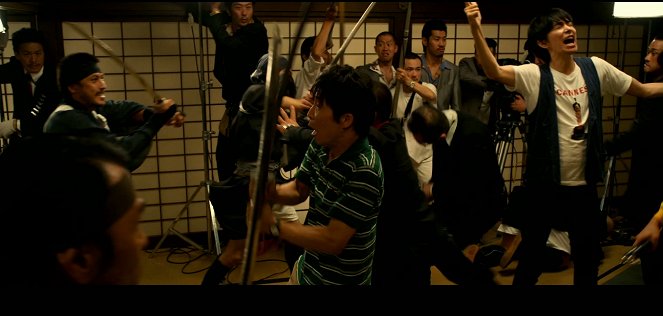Regie:
Shion SonoDrehbuch:
Shion SonoKamera:
山本英夫Besetzung:
長谷川博己, Fumi Nikaidou, Gen Hoshino, 堤真一, Jun Kunimura, Tak Sakaguchi, Akihiro Kitamura, Tarō Suwa, Denden, ミッキー・カーチス, Tetsu Watanabe, Chiba Kazuma (mehr)Inhalte(1)
Master filmmaker Sion Sono (Love Exposure; Cold Fish) describes his frenzied, gleeful new masterpiece as "an action film about the love of 35mm." Based on a screenplay he wrote nearly fifteen years ago, Why Don't You Play In Hell? is among Sono's very best work, as his trademark excess and outrageousness is infused with an affection for the previous century of Japanese cinema. This is Sion Sono with his talent and unique vision completely unleashed. There's a war going on, but that won't stop the inexperienced but eager wannabe film crew The Fuck Bombers from following their dreams of making the ultimate action epic. Ten years ago, yakuza mid-boss Ikegami led an assault against rival don Muto. Now, on the eve of his revenge, all Muto wants to do is complete his masterpiece, a feature film with his daughter in the starring role, before his wife is released from prison. And The Fuck Bombers are standing by with the chance of a lifetime: to film a real, live yakuza battle to the death...on 35mm! (Drafthouse Films)
(mehr)Kritiken (3)
I’m not a Sionist :), I’ve watched a couple of his films and never gave them more than three stars; and I almost didn’t survive Guilty of Romance, but this one was good. It’s an incredibly fun meta joke that at times will make any film enthusiast smile like an idiot. Needless to say, it’s really insane, but this time also somewhat accessible for western audiences. 9/10
()
Whereas other Japanese directors whose names became fixed in the consciousness of western film enthusiasts at the turn of the millennium have since transitioned into the mainstream or have stagnated or even gone quiet in their work, Shion Sono still has the mark of a non-conformist filmmaker and, furthermore, he has not let up in the pace at which he releases new films. Though it cannot be said that every one of his new films is a masterpiece, and he is also apparently swayed by demand on occasion (Guilty of Romance), he still regularly makes films that captivate with their distinctiveness. Even in the context described above, Why Don't You Play in Hell? is surprising as a work characterised by extraordinary broad-mindedness. It takes the same approach as its subject, a group of enthusiastic amateur filmmakers who simply want to shoot a movie and not bother with any norms or rules. Here we have a refreshingly unpredictable eruption of ideas, though it remains a work exhibiting professional craftsmanship and a reflection on popular genres polished over the course of years – the result is a perfect hybrid of techniques that one would associate with the otherwise contradictory worlds of enthusiastic novices and seasoned veterans. In terms of genre, Sono conceived the film as a muti-layered reflection on yakuza movies. He pits one gang, seemingly cut out of 1960s ninkyo yakuza flicks (virtuous heroes, poetic ideals, a historical setting, sword fights), against the other, looking like something out of video productions of the 1980s and ‘90s (loutish goons, bosses as businessmen, wild shootouts). The narrative then culminates in a classic nagurikomi climax (a raid on the enemy gang’s headquarters) and everything is recorded in the de facto journalistic style of the revisionist jitsuroku yakuza movies of the 1970s. Instead of Tarantino-esque eclecticism, however, Sono doesn’t combine old elements into the ultimate yakuza film, but instead creates a farce in which he places inappropriate characters in classic situations. At the same time, however, Why Don't You Play in Hell? is a melancholic ode to a classic film subject and a celebration of film as a medium for making dreams come true. Sono’s distinctiveness is apparent also at this level, as he shows the power of film at the level of enthusiasm and idealism that unites revolutionary masters and new talents, as well as dabblers and amateur fans – as David “The Rock” Nelson said: “If you got a video camera, stick a blank tape in that machine, and film the dang thing!”
()
Whoooa! Dieser vielseitige verrückte Filmfuchs hat einen Hund mit einer Katze gebacken. Der Film hat einen großartigen Start und hört in der ersten halben Stunde überhaupt nicht auf. Blut, Humor, Meta-Witze, Anspielungen auf Filmfans, Genrespiel, Selbstparodie, Actionszenen... Und es endet mit einer mehr als zwanzigminütigen Sequenz, in der sich zwei Mafiaclans bekämpfen, Gliedmaßen fliegen durch die Luft, Blut spritzt in alle Richtungen, Kokain liegt auf dem Boden und alles wird von aufgekratzten Filmemachern auf Inlineskates gefilmt, die dabei teuflisch lachen. Das rasante Tempo wird nur gelegentlich durch ernsthafte Passagen gestört, die mit ihrer Ernsthaftigkeit einfach nicht in den restlichen verrückten Teil passen und eher peinlich wirken. Ansonsten Daumen hoch, besonders wenn Sie wissen, worauf Sie sich einlassen, und brutal verrückte, japanische Wahnsinnigkeiten mögen.
()

